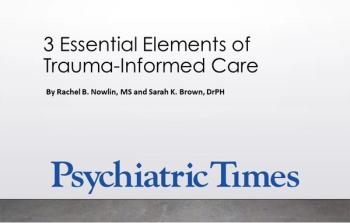
Patients with serious mental illness such as schizophrenia are more likely to report greater impairment in general functioning as a result of trauma, which is why trauma-informed care is so important.

Patients with serious mental illness such as schizophrenia are more likely to report greater impairment in general functioning as a result of trauma, which is why trauma-informed care is so important.

A psychiatrist attempts to stay positive while facing her parents' and loved ones' premature deaths-ever reminding us that hope springs eternal.
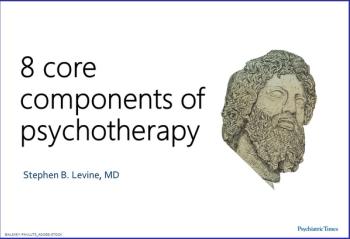
These simple tips may help take the mystery out of the process of psychotherapy and put us in a better position to understand our patients-and ourselves.

What do functional magnetic resonance neuroimaging findings reveal about the neurobiology of borderline personality disorder? Take the quiz and learn more.

Inquiring about a patient’s favorite movie sometimes proves unexpectedly revealing.

Recent studies and meta-analyses discussed here address mental health hospitalization, optimal treatment, and long-term outcome for children and adolescents with anxiety disorders.

What is your first impression of this Rorschach image? Take the quiz and see how others voted.

When engaging in professional discourse on controversial topics, how can psychiatrists respect the therapeutic boundary with patients when their own fears are heightened?

This mode of therapy, still in its infancy, could be used to analyze and monitor a patient’s progress during play.

This article provides a brief synopsis of the research regarding the use of psychotherapy to manage suicidal behavior, followed by several examples of strategies that such treatment employs.

Lacan has a devoted following throughout much of the non-English-speaking world (where he is the best-known psychoanalyst) but he is mostly unknown to the English-speaking psychiatric community (where he is the least-known psychoanalyst).

A chance encounter with a patient who had been slowly and painfully emerging from under the oppressive burden of a recent life-threatening illness and impairing mood symptoms changed everything for all parties involved.

In considering how best to disseminate the many psychotherapeutic techniques to practicing clinicians, the author reviews findings and changes to guidelines on depression treatments.
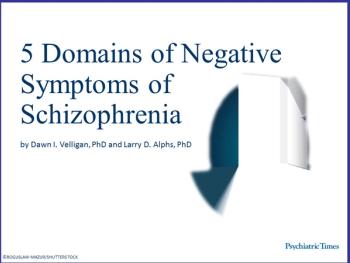
Negative symptoms identified from the Negative Symptom Assessment and the behaviors that might be observed in each of 5 domains.
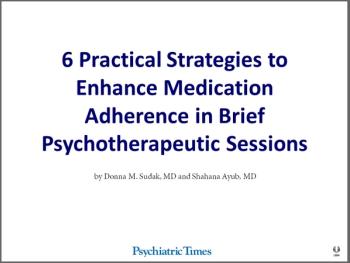
Make the most of brief psychotherapeutic sessions with these practical tips.

Over the years, I have found a number of metaphors, adages, and even a parable to be helpful in letting my patients know that they have been heard and to provide them with psychological comfort and support.

The long-lasting impact of psychoanalysis on American psychiatry should continue to be taught and celebrated, if only as a testament to the human ability to seek understanding and find meaning in man’s suffering.

Motivational interviewing can be very useful for addressing patients' ambivalence about psychopharmacologic issues. Take the quiz and learn more.

Here's a hit list of publications devoted to psychotherapy topics; to issues in genomic medicine; the impact of technology, and burnout on the practice of medicine; and to more traditional clinical articles addressing diagnosis and treatment of psychiatric disorders.

This year we asked about the best and worst things relating to our field. As always, we received a diverse group of responses.
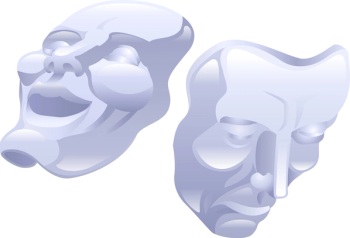
This article focuses on treatment resistance to medications in adult male and non-pregnant adult female outpatients with any type of DSM-5 diagnosed bipolar disorder.

The authors outline a series of strategies that can help promote adherence to the therapeutic regimen.

The author presents a fictionalized case based on a real patient to encourage colleagues to pursue psychodynamic psychiatry.
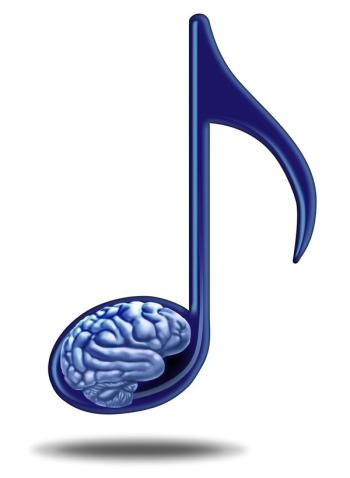
Most of us listen in one way or another. But listening can be taken for granted, even in psychiatry.

In psychiatry, things happen slowly-but if you’re not in a hurry yourself, the patient opens a window and shows you the world.